- Home
- Chuck Palahniuk
Adjustment Day Page 3
Adjustment Day Read online
Page 3
Piper studied the text. Printed across the top of the page in a large typeface was, “Declaration of Interdependence.”
There were no protesters. The National Mall, stretching from the Capitol Building to the Washington Monument, it should’ve been filled with protesters. Milling, chanting, sign-waving hippy-dippy hordes. Millions of antiwar demonstrators. The phones in his office, the office of Senator Holbrook Daniels on the fifth floor of the Hart Senate Office Building, the phones should be ringing off the hook. The phones were silent. None of the millions of furious emails his staff had expected were appearing in his senatorial inbox.
No, the only sign of activity was a small crew of construction workers. From his high window, Senator Daniels watched them excavating a wide trench. It was roughly the dimensions of two Olympic-sized swimming pools placed end-to-end. The work was taking place on the lawn between First Avenue and the Capitol steps.
The stupid blue-collar slobs doing the digging, the senator almost pitied them. He settled into a leather desk chair in his air-conditioned, public-financed inner sanctum. If they weren’t going off to die soon, their sons would be. Their sons and grandsons or nephews. Their apprentices and their journeymen. The surplus males of a generation.
With the vote on the National War Resolution only days away, angry and frightened Americans should’ve been beating down his door. None were. Not only was his office silent, but every office in the building seemed as hushed as a church. His assistants and pages had checked with the switchboard and the IT guys. The phones and servers were working.
His best guess was that Americans were too fractured along the fault lines of personal identity politics. It seemed that no one cared about others being compelled to gird their loins and perish. Recent politics had effectively branded young men as an internal enemy—perpetrators of rape culture, school shooters, and neo-Nazis—and media-frightened Americans were glad to see these bad apples culled.
The mass media had done its state-instructed job to demonize draft-age men, greasing the skids for their induction.
Before the end of this week, elected federal officials would vote unanimously to reinstate the military draft and commit two million young men to fighting a war in North Africa. Likewise, the leaders of a dozen countries in West Africa and the Middle East would pit an equal number of young men against the Americans.
Grim but true, rumor had it that this would be the fastest world war in history. Once the combatants were mustered along the battle front, a thermonuclear strike would eradicate everyone involved. A nonexistent terrorist group would be blamed for the nuke, and the warring nations could withdraw with no loss of face. The war would be declared a “draw.”
Yet another war to end all wars.
From his office window, Daniels marveled at how fast the pit was being dug. In D.C. public works projects lasted for years while the parties involved lined their pockets with taxpayer money. Whatever motivated the crew just across Constitution Avenue, it had to be something beyond the monetary. Even as he watched, the earth-moving equipment sunk deeper, almost out of sight, as the mound of dirt grew taller along one edge of the vast hole.
The plans for this war had been unfolding since the first of the Millennial generation had been born. The Census Bureau had recognized that the Millennials would be the largest demographic in national history. They’d be healthy and well educated, and eventually they’d all want respect and power. The dynamic had played itself out in countries like Rwanda and Ivory Coast, where surplus young men had sparked civil wars until the national infrastructure had been destroyed and the entire population reduced to grinding poverty.
For a time, American officials had kept the lid on this human powder keg by dosing the boys with Ritalin. After that, peace came in the form of endless online gaming and pornography—all covertly supplied by government contractors. Despite those efforts this generation was waking up to its mortality. They wanted more than drugged, time-wasting numbness.
Unless the United States could resolve a sizable portion of its restless bad-boy problem, this nation would be doomed to the same misery as Haiti and Nigeria. America’s version of the Arab Spring was just around the next corner.
Today, the Millennial males were already committing skyrocketing rates of violent crime in places like Chicago, Philadelphia, and Baltimore. They were hacking into state secrets so it was vital to implement the new war and purge the youth bulge. If the public ever caught wind of this plan, it might lead to a revolution. Families fighting to save their sons. Men fighting to save themselves.
As far as their loved ones need know, these young men would die heroes. They’d venture into battle like their forefathers and sacrifice their lives for the comfort and security of their fellow Americans back home.
The senator looked down on the workmen digging away in the afternoon sun. Sweating in the humid Potomac summer. He smirked, considering how in a few weeks there would be a sizable surplus of women. Feminism would fade out, and ladies would have to play nice or risk dying alone and being devoured by their cats. Less social upheaval, more available babes. For Senator Daniels and men like him, the war resolution was a win-win.
Far below him, the laborers swarmed like ants. Like obedient drones doing the bidding of their master.
At last the reality of their project dawned on the senator. It was obvious. They were preemptively building a memorial to the soldiers who’d be dead by Halloween. This was someone’s extremely efficient idea. Rising from that ominous pit would be a white-marble confection of Greco-Roman statues and columns, the usual emotionally cathartic frou-frou. It made sense to begin construction now, even before the war was declared. The faster the dead could be honored, the faster they could be forgotten.
Here was an expedited shrine. Being erected even before the college students and pizza delivery boys and skateboarders received their draft notices. Proactively, their names were already being chiseled into marble plaques to honor the dead.
Now the world made perfect, logical sense. And slowly, between the softness of his leather chair, the lull of the air conditioning, and the unassailed silence of his office, Senator Holbrook Daniels drifted to sleep.
Frankie’s dad told him that sometimes firemen need to burn down a bad house on purpose in order to save a good neighborhood. A type of back-burn, they called it when fighting forest fires.
The father and son had been driving around in the white Fire Marshall car with the special sticker on the back window and the red light on the dashboard, except the light wasn’t switched on. They drove past spray-painted houses, houses with wood nailed over the gone windows, houses where only a basement was left, like a swimming pool filled with weeds and trees growing inside.
They drove to Frankie’s old school from before he started remote learning on the computer in their kitchen at home. After the day that Frankie’s dad called the Last Straw. After a bunch of kids dog-piled him at lunch. After they took turns stomping his head against the lunchroom floor, something Frankie couldn’t remember, even after the teachers had shown them the lunchroom video and the camera movies some kids had posted on World Star Hip Hop.
Today, same as before, his dad brought a Super Soaker, the deluxe model with the bigger tank, made to shoot longer and farther.
Firemen have a special key, his dad showed him. It opens every door. Another special key shuts off the security alarm. He told Frankie not to mind about the security videos. The high-up cameras watched them go down every hallway, walking past Frankie’s old locker, past the spot where nobody did anything besides videotape him getting his face stomped. Any trace of blood had been scrubbed away.
Same as usual, his dad worked the pump action on the Super Soaker, spraying every bulletin board hung with paper. Hosing every school spirit banner, with that service station smell. As they strolled the hallways, Frankie’s dad squirt-gunned the smell of filling the lawnmower and cleaning paintbrushes. He sprayed the ceiling tiles until they were so saturated they warped and sagged.
/> This was his secret recipe of Styrofoam ground down to just its little white balls, dissolved in gasoline with Vaseline stirred in to make it thick, to make it sticky so when he sprayed the gunk on the ceiling it never dripped, and when he sprayed it on window glass it didn’t run down.
He’d added some paint thinner as a surfactant, his dad explained, to break the surface tension so the ooze wouldn’t bead up but would coat everything more evenly.
It was summer vacation so Frankie knew no hamsters or goldfish lived in any classroom.
His dad took aim and soaked a security camera that was spying on them.
After the day of the lunchroom beat-down Frankie couldn’t remember, his dad never looked at him. If his dad looked in his direction all he saw was the scar that now ran down the side of Frankie’s face. A red line shaped like the curved edge of a Nike basketball shoe where the cheek skin had torn. Even now walking down the empty summer hallway lined with lockers but no padlocks, Frankie could feel his dad sneak looks at the scar. Frankie’s dad never smiled at him, not after that day. He scowled, but he was scowling at the scar. The ghost of that final last stomp. The last day in public school.
Lining the halls, big posters showed smiling kids from every place on the planet. Holding hands under a rainbow with covering the rainbow the words “Love Comes in Every Color.”
His dad hosed the poster. Doing so, the look on his dad’s face was worse than any scar. From his expression, he wanted to be spraying this fire juice into the eyes and mouths of those kids who’d left their footprints on Frankie for the rest of his life.
The whole time Frankie’s dad super-soakered the school walls, he yelled stuff like, “Eat it, cultural Marxism!” And, “Get fucked, vibrant ethnic diversity!”
His dad hosed the poster until it sagged and slid down the wet wall. By then the soaker was empty and he pitched it a long ways, almost all the way to the school office.
“In a little bit, kid,” said Frankie’s father, “I’m going to do you a solid one.”
Frankie couldn’t picture that. The kids who’d kicked his ass, they still went here. None of them had been sent home. But it helped to know that after today nobody would go here.
“Maybe they caught us off-guard once,” his dad said, “but we’ll get our revenge.”
Frankie followed his dad into a bathroom and waited while he washed his hands.
His dad said, “Nobody is going to shit on this family, ever again.”
Before they went out to the car, his dad took out his phone and placed a call. He said, “Hello, may I speak to your news director?” With one hand he dug in his pants pocket. “This is Fire Marshall Benjamin Hugh. We’re currently responding to reports that the Golden Park Elementary School is ablaze.” From his pocket he withdrew a book of matches. He ended the call and placed another.
“Hello, may I speak to the City Desk?” Frankie’s father held the matches out to his son. Frankie took them. Waiting, his father turned away from the phone and said, “Today is just practice. Just to see how many show up.”
Into the phone, he said, “I’ve gotten word that arsonists have struck another local school.” He listened. “It’s Golden Park Elementary.”
Frankie stood by, holding the matches, just as he’d stood by at Madison Middle School and Immaculate Heart and the three schools before. Frankie figured this would be the last school, and that his dad had only burned the others so this one wouldn’t look special. When his dad was finished with the last phone call, then Frankie knew what came next.
In his heart, Frankie knew that the bad parts of the world would have to be burned away to save the best parts.
“Frankie, you . . . ,” his dad knelt in front of him and took both of Frankie’s small hands in his own, saying, “Son, these dipshits will pay you tribute for the rest of your life!” He let fall one of the small hands and reached up to stroke the scar on the side of Frankie’s innocent, trusting face. “My boy. You will grow to become a king! And your sons will be princes!” He lifted the one small hand he still held and put it to his own lips.
As a special treat, his father let Frankie light the match.
After that they went outside to count how many reporters and cameramen would show up. At first it was only a couple television crews, but now every station came, plus some foreigners in town for the serial arson story. The newspaper sent a team. Even a helicopter. Radio stations sent people. Frankie’s dad took notes and strategized his clearest angles and best shots, to see how easy his work would be when the actual day came.
Only then did Frankie’s dad dial 9-1-1.
Before everything you’ve read so far in this book . . . before this book was a book, it was the dream of Walter Baines.
Back in the world you still know . . . back in Before Times, here’s how Walter had always dreamed of doing it.
On Shasta’s twenty-fifth birthday he’d suggest taking a bus, the bus going uphill, the one that most days carries her mom and the other housecleaners to work. He’d wear his lucky Lamborghini scarf even if it’s so old it’s turning back into dirty wool.
The two of them would catch the last bus of the night, following the route past that house. Not the house Mrs. Shasta cleans but the one with Scarlett O’Hara columns lining the front porch and the rooflines and lightning rods and red-brick chimneys rising above the ancestral oak trees. It’s the house Shasta has always gawked at the way a dog eyeballs a squirrel, like that pile of bricks and ivy is her pornography. One stop past the house in question Walter would step off the bus and walk back to where the windows would be dark. When she pulled away, he’d get her, tight, around one wrist and tug, gently, saying, “It’s a surprise,” leading her past a statue that creeps him out.
It’s a monkey made out of that metal where if you touched it on a cold day you’d be touching it forever, and anyone who touched you would stick as would people who touched them until everyone in the world would be trapped together like Ice-nine in Vonnegut. The little statue brings to mind a little monkey dressed as a clown, maybe to ride a horse only with his face painted white. Like in Japan.
Walter would cross the damp grass, beyond the Kabuki-faced monkey-clown statuette, past the little yellow sign for the alarm company.
To mark the occasion, Walter would pull out his lucky pipe and tamp the bowl full of Hindu Kush. Ever the gentleman, he’d offer Shasta the first hit.
He’d pat his hip pocket to double check for a bulge, a round bulge like old-school Kennedy half dollars, like pirate doubloons or chocolate geld—in reality only gold foil-wrapped condoms his ma distributes wholesale. His fingertips would trace the outline of something else, coiled, a larger circle, a loop of something tucked deep in his back pocket.
Walter would lead her, shivering, onto the porch, where and when she’d hide behind a column, standing sideways-skinny in the shadows, blocked from the street. She’d be trusting him but be ready to run. Then and there, he’d say, “Let me go get your birthday present,” and he’d disappear around the side of the house.
She’ll cower there, hearing crickets chirp and the hiss of in-ground sprinklers. Smelling this and that. The nighttime air carries swimming pool chlorine and the vanilla fabric softener of billowing steam from some dryer vent. A private security patrol will cruise by playing its searchlight over the hedges. Since her finger-painting days, this house has stood here, filled with history, never changing, a place where she could never imagine feeling afraid. Here and now she’s hugging herself behind a column, looking on her phone for a taxi, surfing the Neighborhood Watch sites to see if anyone’s reported two prowlers.
The front door creaks open. As if by itself, the paneled, white-painted door will swing aside on its brass hinges. Nightmare slow. Before she can bolt down the steps, comes a whisper from the darkness inside the front hallway, Walter’s voice whispering, “Happy Birthday, Shasta.”
Walter will edge his head out until the porch light puts a white mask on his face, wave a hand for her to come
inside. He’ll whisper, “It’s okay.”
She’ll stand there between the fear she feels and what she wants most: the end of all fear.
He’ll say, “Hurry.”
She’ll give the empty, dark street one last look and step inside.
He’ll shut the door. The two of them will kiss until her eyes adjust so she can look around in the half-light. Take note of the brass chandelier holding a forest of fake candles above their heads. Check out the stairway curving down, out of the darkness. The carved, leather-scented wood of everything. From somewhere, Walter will hear a clock ticking, loud against the silence. Little smears of light will bounce off a swinging, polished silver pendulum. Flicker in shades of blue off the mirror above a fireplace.
The thing about Shasta is the taste of her mouth. In his experience a girl can be beautiful with all the tits in the world, long legs and a button nose, but a bad-tasting mouth makes her only as good as porn. Shasta, the inside of her mouth reminds him of high-fructose corn syrup, like soaking Maraschino cherries stewed with red #5 and gelatin until her tongue has the mouth-feel of a Hostess fruit pie flaking sugar like a baby snake shedding its sweet, dead, sweet skin. Until every French kiss is him deep-throating a semi-molten, sugar-coated snake, like a little garter snake or a garden variety brown boa. Like Walter’s mouth is locked overnight in a delicious combination reptile house and Danish pastry shop.
She’ll whisper about the alarm system, and he’ll point upward. Her gaze will follow his arm to a camera mounted high on one wall. When and where he’ll give her a silent thumbs-up, A-Okay. He’ll explain that he hacked the system. Before they even boarded the bus, Walter deactivated everything, remotely. He found a window unlocked in the back. He’d been planning this for weeks. No one will ever know they were here.
As irrefutable evidence that he’s more than a slack-jawed, single-digit brain cell burner, he’ll explain about network enumeration and exploitation. Walter will boast about his genius cryptographic keys while leading her toward the stairs.
There were no protesters. The National Mall, stretching from the Capitol Building to the Washington Monument, it should’ve been filled with protesters. Milling, chanting, sign-waving hippy-dippy hordes. Millions of antiwar demonstrators. The phones in his office, the office of Senator Holbrook Daniels on the fifth floor of the Hart Senate Office Building, the phones should be ringing off the hook. The phones were silent. None of the millions of furious emails his staff had expected were appearing in his senatorial inbox.
No, the only sign of activity was a small crew of construction workers. From his high window, Senator Daniels watched them excavating a wide trench. It was roughly the dimensions of two Olympic-sized swimming pools placed end-to-end. The work was taking place on the lawn between First Avenue and the Capitol steps.
The stupid blue-collar slobs doing the digging, the senator almost pitied them. He settled into a leather desk chair in his air-conditioned, public-financed inner sanctum. If they weren’t going off to die soon, their sons would be. Their sons and grandsons or nephews. Their apprentices and their journeymen. The surplus males of a generation.
With the vote on the National War Resolution only days away, angry and frightened Americans should’ve been beating down his door. None were. Not only was his office silent, but every office in the building seemed as hushed as a church. His assistants and pages had checked with the switchboard and the IT guys. The phones and servers were working.
His best guess was that Americans were too fractured along the fault lines of personal identity politics. It seemed that no one cared about others being compelled to gird their loins and perish. Recent politics had effectively branded young men as an internal enemy—perpetrators of rape culture, school shooters, and neo-Nazis—and media-frightened Americans were glad to see these bad apples culled.
The mass media had done its state-instructed job to demonize draft-age men, greasing the skids for their induction.
Before the end of this week, elected federal officials would vote unanimously to reinstate the military draft and commit two million young men to fighting a war in North Africa. Likewise, the leaders of a dozen countries in West Africa and the Middle East would pit an equal number of young men against the Americans.
Grim but true, rumor had it that this would be the fastest world war in history. Once the combatants were mustered along the battle front, a thermonuclear strike would eradicate everyone involved. A nonexistent terrorist group would be blamed for the nuke, and the warring nations could withdraw with no loss of face. The war would be declared a “draw.”
Yet another war to end all wars.
From his office window, Daniels marveled at how fast the pit was being dug. In D.C. public works projects lasted for years while the parties involved lined their pockets with taxpayer money. Whatever motivated the crew just across Constitution Avenue, it had to be something beyond the monetary. Even as he watched, the earth-moving equipment sunk deeper, almost out of sight, as the mound of dirt grew taller along one edge of the vast hole.
The plans for this war had been unfolding since the first of the Millennial generation had been born. The Census Bureau had recognized that the Millennials would be the largest demographic in national history. They’d be healthy and well educated, and eventually they’d all want respect and power. The dynamic had played itself out in countries like Rwanda and Ivory Coast, where surplus young men had sparked civil wars until the national infrastructure had been destroyed and the entire population reduced to grinding poverty.
For a time, American officials had kept the lid on this human powder keg by dosing the boys with Ritalin. After that, peace came in the form of endless online gaming and pornography—all covertly supplied by government contractors. Despite those efforts this generation was waking up to its mortality. They wanted more than drugged, time-wasting numbness.
Unless the United States could resolve a sizable portion of its restless bad-boy problem, this nation would be doomed to the same misery as Haiti and Nigeria. America’s version of the Arab Spring was just around the next corner.
Today, the Millennial males were already committing skyrocketing rates of violent crime in places like Chicago, Philadelphia, and Baltimore. They were hacking into state secrets so it was vital to implement the new war and purge the youth bulge. If the public ever caught wind of this plan, it might lead to a revolution. Families fighting to save their sons. Men fighting to save themselves.
As far as their loved ones need know, these young men would die heroes. They’d venture into battle like their forefathers and sacrifice their lives for the comfort and security of their fellow Americans back home.
The senator looked down on the workmen digging away in the afternoon sun. Sweating in the humid Potomac summer. He smirked, considering how in a few weeks there would be a sizable surplus of women. Feminism would fade out, and ladies would have to play nice or risk dying alone and being devoured by their cats. Less social upheaval, more available babes. For Senator Daniels and men like him, the war resolution was a win-win.
Far below him, the laborers swarmed like ants. Like obedient drones doing the bidding of their master.
At last the reality of their project dawned on the senator. It was obvious. They were preemptively building a memorial to the soldiers who’d be dead by Halloween. This was someone’s extremely efficient idea. Rising from that ominous pit would be a white-marble confection of Greco-Roman statues and columns, the usual emotionally cathartic frou-frou. It made sense to begin construction now, even before the war was declared. The faster the dead could be honored, the faster they could be forgotten.
Here was an expedited shrine. Being erected even before the college students and pizza delivery boys and skateboarders received their draft notices. Proactively, their names were already being chiseled into marble plaques to honor the dead.
Now the world made perfect, logical sense. And slowly, between the softness of his leather chair, the lull of the air conditioning, and the unassailed silence of his office, Senator Holbrook Daniels drifted to sleep.
Frankie’s dad told him that sometimes firemen need to burn down a bad house on purpose in order to save a good neighborhood. A type of back-burn, they called it when fighting forest fires.
The father and son had been driving around in the white Fire Marshall car with the special sticker on the back window and the red light on the dashboard, except the light wasn’t switched on. They drove past spray-painted houses, houses with wood nailed over the gone windows, houses where only a basement was left, like a swimming pool filled with weeds and trees growing inside.
They drove to Frankie’s old school from before he started remote learning on the computer in their kitchen at home. After the day that Frankie’s dad called the Last Straw. After a bunch of kids dog-piled him at lunch. After they took turns stomping his head against the lunchroom floor, something Frankie couldn’t remember, even after the teachers had shown them the lunchroom video and the camera movies some kids had posted on World Star Hip Hop.
Today, same as before, his dad brought a Super Soaker, the deluxe model with the bigger tank, made to shoot longer and farther.
Firemen have a special key, his dad showed him. It opens every door. Another special key shuts off the security alarm. He told Frankie not to mind about the security videos. The high-up cameras watched them go down every hallway, walking past Frankie’s old locker, past the spot where nobody did anything besides videotape him getting his face stomped. Any trace of blood had been scrubbed away.
Same as usual, his dad worked the pump action on the Super Soaker, spraying every bulletin board hung with paper. Hosing every school spirit banner, with that service station smell. As they strolled the hallways, Frankie’s dad squirt-gunned the smell of filling the lawnmower and cleaning paintbrushes. He sprayed the ceiling tiles until they were so saturated they warped and sagged.
/> This was his secret recipe of Styrofoam ground down to just its little white balls, dissolved in gasoline with Vaseline stirred in to make it thick, to make it sticky so when he sprayed the gunk on the ceiling it never dripped, and when he sprayed it on window glass it didn’t run down.
He’d added some paint thinner as a surfactant, his dad explained, to break the surface tension so the ooze wouldn’t bead up but would coat everything more evenly.
It was summer vacation so Frankie knew no hamsters or goldfish lived in any classroom.
His dad took aim and soaked a security camera that was spying on them.
After the day of the lunchroom beat-down Frankie couldn’t remember, his dad never looked at him. If his dad looked in his direction all he saw was the scar that now ran down the side of Frankie’s face. A red line shaped like the curved edge of a Nike basketball shoe where the cheek skin had torn. Even now walking down the empty summer hallway lined with lockers but no padlocks, Frankie could feel his dad sneak looks at the scar. Frankie’s dad never smiled at him, not after that day. He scowled, but he was scowling at the scar. The ghost of that final last stomp. The last day in public school.
Lining the halls, big posters showed smiling kids from every place on the planet. Holding hands under a rainbow with covering the rainbow the words “Love Comes in Every Color.”
His dad hosed the poster. Doing so, the look on his dad’s face was worse than any scar. From his expression, he wanted to be spraying this fire juice into the eyes and mouths of those kids who’d left their footprints on Frankie for the rest of his life.
The whole time Frankie’s dad super-soakered the school walls, he yelled stuff like, “Eat it, cultural Marxism!” And, “Get fucked, vibrant ethnic diversity!”
His dad hosed the poster until it sagged and slid down the wet wall. By then the soaker was empty and he pitched it a long ways, almost all the way to the school office.
“In a little bit, kid,” said Frankie’s father, “I’m going to do you a solid one.”
Frankie couldn’t picture that. The kids who’d kicked his ass, they still went here. None of them had been sent home. But it helped to know that after today nobody would go here.
“Maybe they caught us off-guard once,” his dad said, “but we’ll get our revenge.”
Frankie followed his dad into a bathroom and waited while he washed his hands.
His dad said, “Nobody is going to shit on this family, ever again.”
Before they went out to the car, his dad took out his phone and placed a call. He said, “Hello, may I speak to your news director?” With one hand he dug in his pants pocket. “This is Fire Marshall Benjamin Hugh. We’re currently responding to reports that the Golden Park Elementary School is ablaze.” From his pocket he withdrew a book of matches. He ended the call and placed another.
“Hello, may I speak to the City Desk?” Frankie’s father held the matches out to his son. Frankie took them. Waiting, his father turned away from the phone and said, “Today is just practice. Just to see how many show up.”
Into the phone, he said, “I’ve gotten word that arsonists have struck another local school.” He listened. “It’s Golden Park Elementary.”
Frankie stood by, holding the matches, just as he’d stood by at Madison Middle School and Immaculate Heart and the three schools before. Frankie figured this would be the last school, and that his dad had only burned the others so this one wouldn’t look special. When his dad was finished with the last phone call, then Frankie knew what came next.
In his heart, Frankie knew that the bad parts of the world would have to be burned away to save the best parts.
“Frankie, you . . . ,” his dad knelt in front of him and took both of Frankie’s small hands in his own, saying, “Son, these dipshits will pay you tribute for the rest of your life!” He let fall one of the small hands and reached up to stroke the scar on the side of Frankie’s innocent, trusting face. “My boy. You will grow to become a king! And your sons will be princes!” He lifted the one small hand he still held and put it to his own lips.
As a special treat, his father let Frankie light the match.
After that they went outside to count how many reporters and cameramen would show up. At first it was only a couple television crews, but now every station came, plus some foreigners in town for the serial arson story. The newspaper sent a team. Even a helicopter. Radio stations sent people. Frankie’s dad took notes and strategized his clearest angles and best shots, to see how easy his work would be when the actual day came.
Only then did Frankie’s dad dial 9-1-1.
Before everything you’ve read so far in this book . . . before this book was a book, it was the dream of Walter Baines.
Back in the world you still know . . . back in Before Times, here’s how Walter had always dreamed of doing it.
On Shasta’s twenty-fifth birthday he’d suggest taking a bus, the bus going uphill, the one that most days carries her mom and the other housecleaners to work. He’d wear his lucky Lamborghini scarf even if it’s so old it’s turning back into dirty wool.
The two of them would catch the last bus of the night, following the route past that house. Not the house Mrs. Shasta cleans but the one with Scarlett O’Hara columns lining the front porch and the rooflines and lightning rods and red-brick chimneys rising above the ancestral oak trees. It’s the house Shasta has always gawked at the way a dog eyeballs a squirrel, like that pile of bricks and ivy is her pornography. One stop past the house in question Walter would step off the bus and walk back to where the windows would be dark. When she pulled away, he’d get her, tight, around one wrist and tug, gently, saying, “It’s a surprise,” leading her past a statue that creeps him out.
It’s a monkey made out of that metal where if you touched it on a cold day you’d be touching it forever, and anyone who touched you would stick as would people who touched them until everyone in the world would be trapped together like Ice-nine in Vonnegut. The little statue brings to mind a little monkey dressed as a clown, maybe to ride a horse only with his face painted white. Like in Japan.
Walter would cross the damp grass, beyond the Kabuki-faced monkey-clown statuette, past the little yellow sign for the alarm company.
To mark the occasion, Walter would pull out his lucky pipe and tamp the bowl full of Hindu Kush. Ever the gentleman, he’d offer Shasta the first hit.
He’d pat his hip pocket to double check for a bulge, a round bulge like old-school Kennedy half dollars, like pirate doubloons or chocolate geld—in reality only gold foil-wrapped condoms his ma distributes wholesale. His fingertips would trace the outline of something else, coiled, a larger circle, a loop of something tucked deep in his back pocket.
Walter would lead her, shivering, onto the porch, where and when she’d hide behind a column, standing sideways-skinny in the shadows, blocked from the street. She’d be trusting him but be ready to run. Then and there, he’d say, “Let me go get your birthday present,” and he’d disappear around the side of the house.
She’ll cower there, hearing crickets chirp and the hiss of in-ground sprinklers. Smelling this and that. The nighttime air carries swimming pool chlorine and the vanilla fabric softener of billowing steam from some dryer vent. A private security patrol will cruise by playing its searchlight over the hedges. Since her finger-painting days, this house has stood here, filled with history, never changing, a place where she could never imagine feeling afraid. Here and now she’s hugging herself behind a column, looking on her phone for a taxi, surfing the Neighborhood Watch sites to see if anyone’s reported two prowlers.
The front door creaks open. As if by itself, the paneled, white-painted door will swing aside on its brass hinges. Nightmare slow. Before she can bolt down the steps, comes a whisper from the darkness inside the front hallway, Walter’s voice whispering, “Happy Birthday, Shasta.”
Walter will edge his head out until the porch light puts a white mask on his face, wave a hand for her to come
inside. He’ll whisper, “It’s okay.”
She’ll stand there between the fear she feels and what she wants most: the end of all fear.
He’ll say, “Hurry.”
She’ll give the empty, dark street one last look and step inside.
He’ll shut the door. The two of them will kiss until her eyes adjust so she can look around in the half-light. Take note of the brass chandelier holding a forest of fake candles above their heads. Check out the stairway curving down, out of the darkness. The carved, leather-scented wood of everything. From somewhere, Walter will hear a clock ticking, loud against the silence. Little smears of light will bounce off a swinging, polished silver pendulum. Flicker in shades of blue off the mirror above a fireplace.
The thing about Shasta is the taste of her mouth. In his experience a girl can be beautiful with all the tits in the world, long legs and a button nose, but a bad-tasting mouth makes her only as good as porn. Shasta, the inside of her mouth reminds him of high-fructose corn syrup, like soaking Maraschino cherries stewed with red #5 and gelatin until her tongue has the mouth-feel of a Hostess fruit pie flaking sugar like a baby snake shedding its sweet, dead, sweet skin. Until every French kiss is him deep-throating a semi-molten, sugar-coated snake, like a little garter snake or a garden variety brown boa. Like Walter’s mouth is locked overnight in a delicious combination reptile house and Danish pastry shop.
She’ll whisper about the alarm system, and he’ll point upward. Her gaze will follow his arm to a camera mounted high on one wall. When and where he’ll give her a silent thumbs-up, A-Okay. He’ll explain that he hacked the system. Before they even boarded the bus, Walter deactivated everything, remotely. He found a window unlocked in the back. He’d been planning this for weeks. No one will ever know they were here.
As irrefutable evidence that he’s more than a slack-jawed, single-digit brain cell burner, he’ll explain about network enumeration and exploitation. Walter will boast about his genius cryptographic keys while leading her toward the stairs.

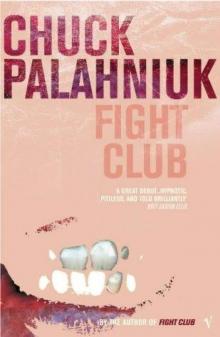 Fight Club
Fight Club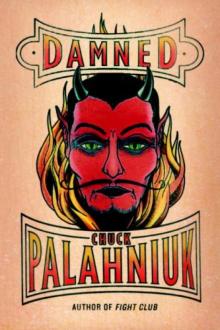 Damned
Damned Tell-All
Tell-All Choke
Choke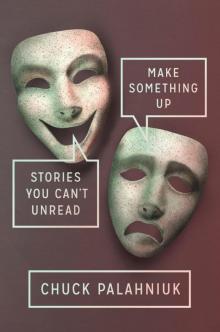 Make Something Up: Stories You Can't Unread
Make Something Up: Stories You Can't Unread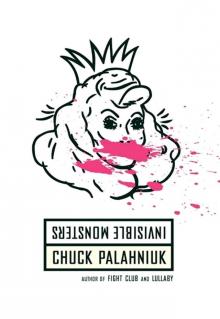 Invisible Monsters
Invisible Monsters Phoenix
Phoenix Beautiful You: A Novel
Beautiful You: A Novel Haunted
Haunted Survivor
Survivor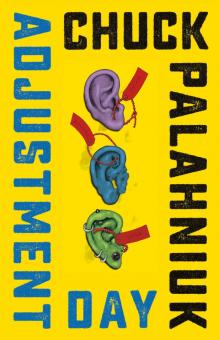 Adjustment Day
Adjustment Day Pygmy
Pygmy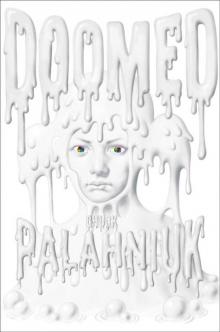 Doomed
Doomed Lullaby
Lullaby Snuff
Snuff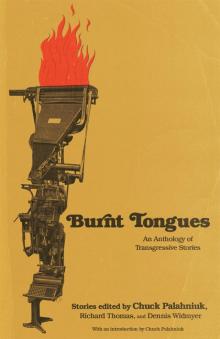 Burnt Tongues
Burnt Tongues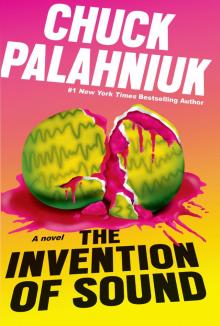 The Invention of Sound
The Invention of Sound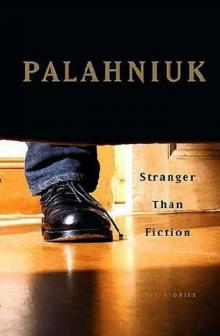 Stranger Than Fiction (True Stories)
Stranger Than Fiction (True Stories)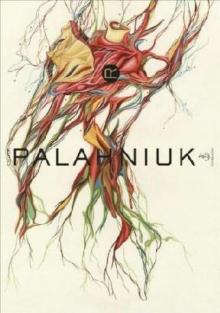 Rant: The Oral History of Buster Casey
Rant: The Oral History of Buster Casey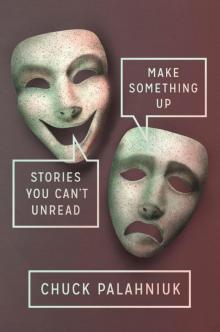 Make Something Up
Make Something Up Rant: An Oral Biography of Buster Casey
Rant: An Oral Biography of Buster Casey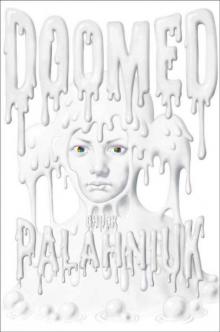 Doomed d-2
Doomed d-2 HOPE AND GORY
HOPE AND GORY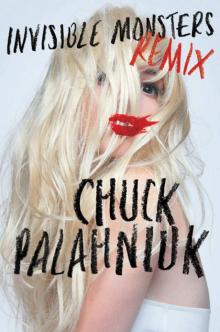 Invisible Monsters Remix
Invisible Monsters Remix Beautiful You
Beautiful You Fugatives & Refugees
Fugatives & Refugees